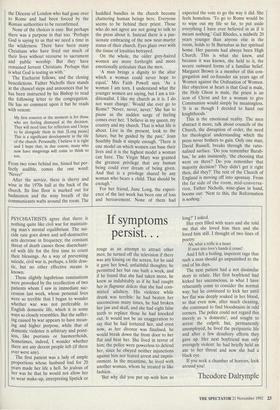If symptoms
persist.. .
PSYCHIATRISTS agree that there is nothing quite like civil war for maintain- ing man's mental equilibrium. The sui- cide rate goes down and self-destructive acts decrease in frequency; the constant threat of death causes those disenchant- ed with life for the first time to count their blessings. As a way of preventing suicide, civil war is, perhaps, a little dras- tic, but no other effective means is known.
These slightly lugubrious ruminations were provoked by the recollection of two patients whom I saw in immediate suc- cession last week, whose personal lives were so terrible that I began to wonder whether war was not preferable to English domestic life, which it in some ways so closely resembles. But the suffer- ing caused by war appears to have mean- ing and higher purpose, while that of domestic violence is arbitrary and point- less, like psoriasis or haemorrhoids. Sometimes, indeed, I wonder whether there are any decent people left (if there ever were any).
The first patient was a lady of ample proportions whose husband had for 20 years made her life a hell. So jealous of her was he that he would not allow her to wear make-up, interpreting lipstick or
rouge as an attempt to attract other men; he turned off the television if there was any kissing on the screen, for he said it gave her lewd, unfaithful thoughts; he permitted her but one bath a week, and if he found that she had taken more, he knew as indubitably as if he had caught her in flagrante delicto that she had com- mitted adultery. His violence while drunk was terrible: he had beaten her unconscious many times, he had broken her jaw and skull, and she had eight false teeth to replace those he had knocked out. It would not be an exaggeration to say that he had tortured her, and even now, as her divorce was finalised, he would break down the front door to her flat and beat her. She lived in terror of him; the police were powerless to defend her, since he obeyed neither injunctions against him nor feared arrest and impris- onment. In the meantime, he lived with another woman, whom he treated in like fashion.
`But why did you put up with him so long?' I asked.
Her eyes filled with tears and she told me that she loved him then and she loved him still. I thought of two lines of poetry:
Ah, what a trifle is a heart If once into love's hands it come!
And I felt a boiling, impotent rage that such a man should go unpunished to the end of his days.
The next patient had a not dissimilar story to relate. Her first boyfriend had kicked her unconscious, in what I have reluctantly come to consider the normal way; but he continued to kick her until her flat was deeply soaked in her blood, so that even now, after much cleaning, she continued to find bloodstains in odd corners. The police could not regard this merely as 'a domestic', and sought to arrest the culprit; but, permanently unemployed, he lived the peripatetic life and after a few desultory efforts they gave up. Her next boyfriend was only averagely violent: he had briefly held an axe to her throat and now she had a black eye.
If you seek a chamber of horrors, look around you!
Theodore Dalrymple










































































 Previous page
Previous page